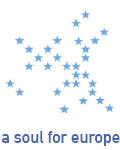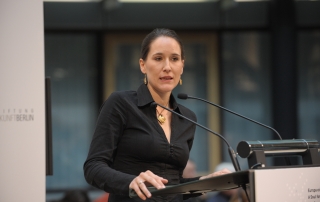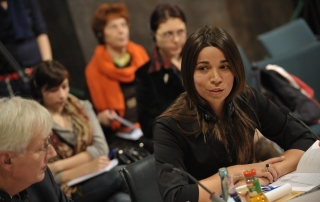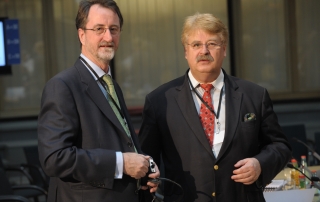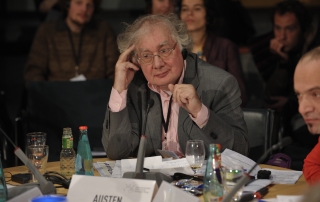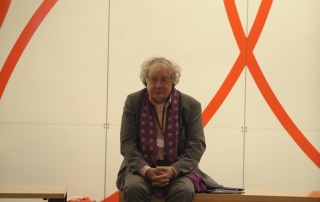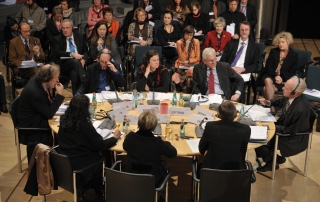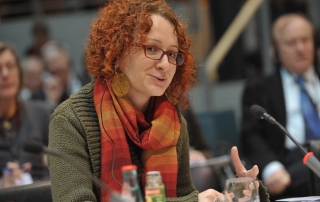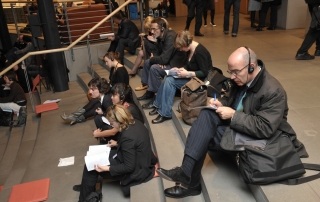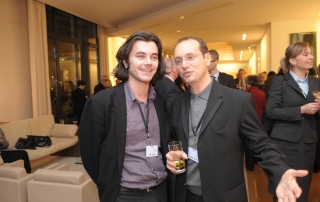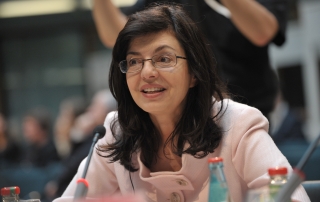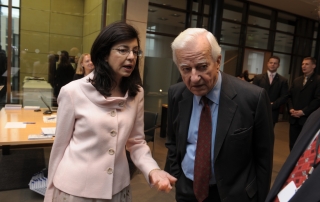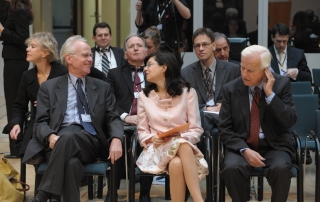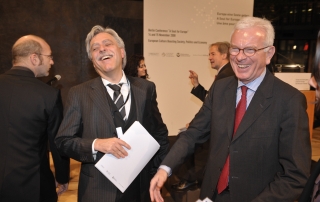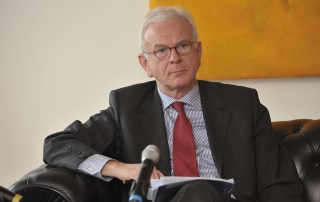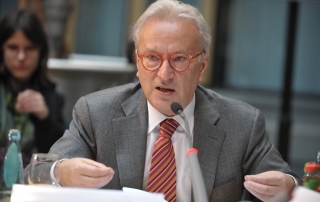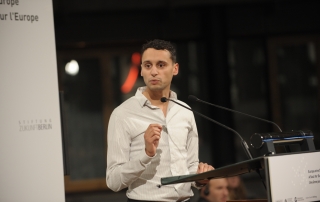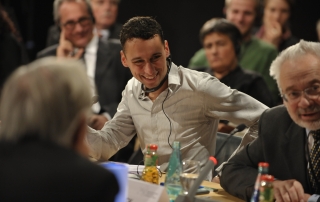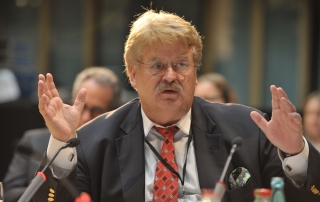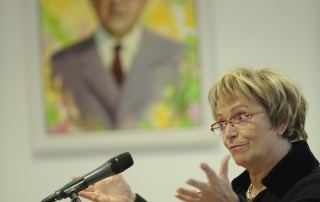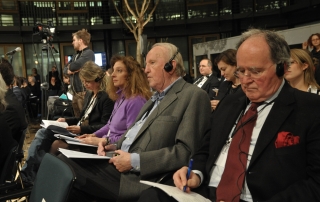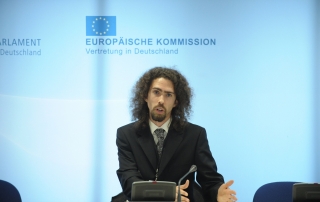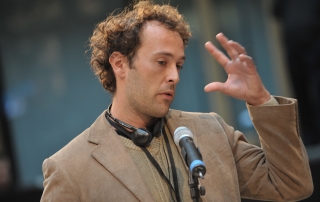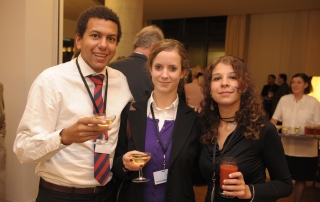Project Description
Berlin Conference 2008
European culture boosting society, politics and economy
Berlin Conference 2008
European culture boosting society, politics and economy
The third Berlin Conference “A Soul For Europe” on 14 to 15 November 2008 acknowledged the manner in which the political and cultural debate has moved on in the last four years, and the enormous challenges which economic and social instability now set in its path. The point was illustrated perfectly by the fact that President Jose Manuel Barroso had to send his message by video because he was at a financial crisis summit in Washington DC, and that he was sending it as President of the Commission, not of the European Union, because of the failure of the new Treaty of Union to be ratified in a referendum by Ireland. The sense of the world outside grappling with economic catastrophe was palpable and was emphasised by the conference setting – the atrium of the Dresdner Bank next to the Brandenburg Gate.
Leaders from industry, politics (European and national), and civil society discussed how to change the political vocabulary and the links between the private and the public spheres.
Louis Schweitzer, Chairman of Renault, argued that business ethics after the recession would have to be different and encompass a more inclusive sense of the relationship between culture, society and economic drivers. Europe, said Miklos Marschall of Transparency International, needs to behave more like a city than a nation state, and is desperately in need of the sort of transformational leadership that has turned round the fortunes of so many great cities in the last thirty years. How to achieve that minorities and people with migration background do not feel themselves excluded? asked Yuriy Vulkovsky, Executive Director of the Altera Foundation (Sofia).
Read the conference report and initial conclusions drawn from the conference here.
Besides the conventional formats such as plenary sessions and workshops, the Berlin Conference 2008 conference offered participants to network, exchange and continue discussions in innovative forms of communication and interaction that are known as world-café and open-space models.
From 2009 onwards, “A Soul for Europe” is undergoing a process of reorganisation by putting a network of 55 young Europeans from 21 countries at the forefront of its work. Read more about the Strategy Group!
The initiative will retain its Steering Committee and the Intergroup in the European Parliament, whose job it is to liaise with political decision-makers on the initiative’s behalf. Both of these preserve the sovereignty of “A Soul for Europe” as an initiative of private individuals and ensures the continued willingness of parliamentarians and political decision-makers to play an active role in the Initiative and in lobbying the “power-holders”.
Photo Gallery
Video Gallery
Culture and Economy in Europe
Involving the younger generations
Inclusive Europe
Intercultural dialogue and foreign policy
Conclusions and outlook Berlin Conference 2008
Audio Gallery
“A Soul for Europe” would like to thank the following partners for their support:
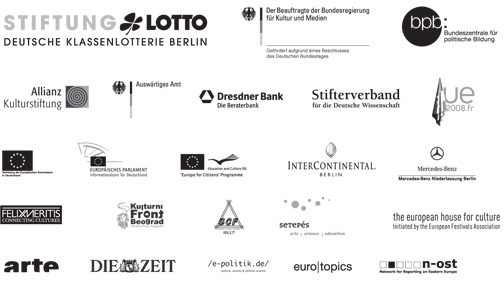
The third Berlin Conference “A Soul For Europe” on 14 to 15 November 2008 acknowledged the manner in which the political and cultural debate has moved on in the last four years, and the enormous challenges which economic and social instability now set in its path. The point was illustrated perfectly by the fact that President Jose Manuel Barroso had to send his message by video because he was at a financial crisis summit in Washington DC, and that he was sending it as President of the Commission, not of the European Union, because of the failure of the new Treaty of Union to be ratified in a referendum by Ireland. The sense of the world outside grappling with economic catastrophe was palpable and was emphasised by the conference setting – the atrium of the Dresdner Bank next to the Brandenburg Gate.
Leaders from industry, politics (European and national), and civil society discussed how to change the political vocabulary and the links between the private and the public spheres.
Louis Schweitzer, Chairman of Renault, argued that business ethics after the recession would have to be different and encompass a more inclusive sense of the relationship between culture, society and economic drivers. Europe, said Miklos Marschall of Transparency International, needs to behave more like a city than a nation state, and is desperately in need of the sort of transformational leadership that has turned round the fortunes of so many great cities in the last thirty years. How to achieve that minorities and people with migration background do not feel themselves excluded? asked Yuriy Vulkovsky, Executive Director of the Altera Foundation (Sofia).
Read the conference report and initial conclusions drawn from the conference here.
Besides the conventional formats such as plenary sessions and workshops, the Berlin Conference 2008 conference offered participants to network, exchange and continue discussions in innovative forms of communication and interaction that are known as world-café and open-space models.
From 2009 onwards, “A Soul for Europe” is undergoing a process of reorganisation by putting a network of 55 young Europeans from 21 countries at the forefront of its work. Read more about the Strategy Group!
The initiative will retain its Steering Committee and the Intergroup in the European Parliament, whose job it is to liaise with political decision-makers on the initiative’s behalf. Both of these preserve the sovereignty of “A Soul for Europe” as an initiative of private individuals and ensures the continued willingness of parliamentarians and political decision-makers to play an active role in the Initiative and in lobbying the “power-holders”.
Photo Gallery
Video Gallery
Culture and Economy in Europe
Involving the younger generations
Inclusive Europe
Intercultural dialogue and foreign policy
Conclusions and outlook Berlin Conference 2008
Audio Gallery
“A Soul for Europe” would like to thank the following partners for their support:

